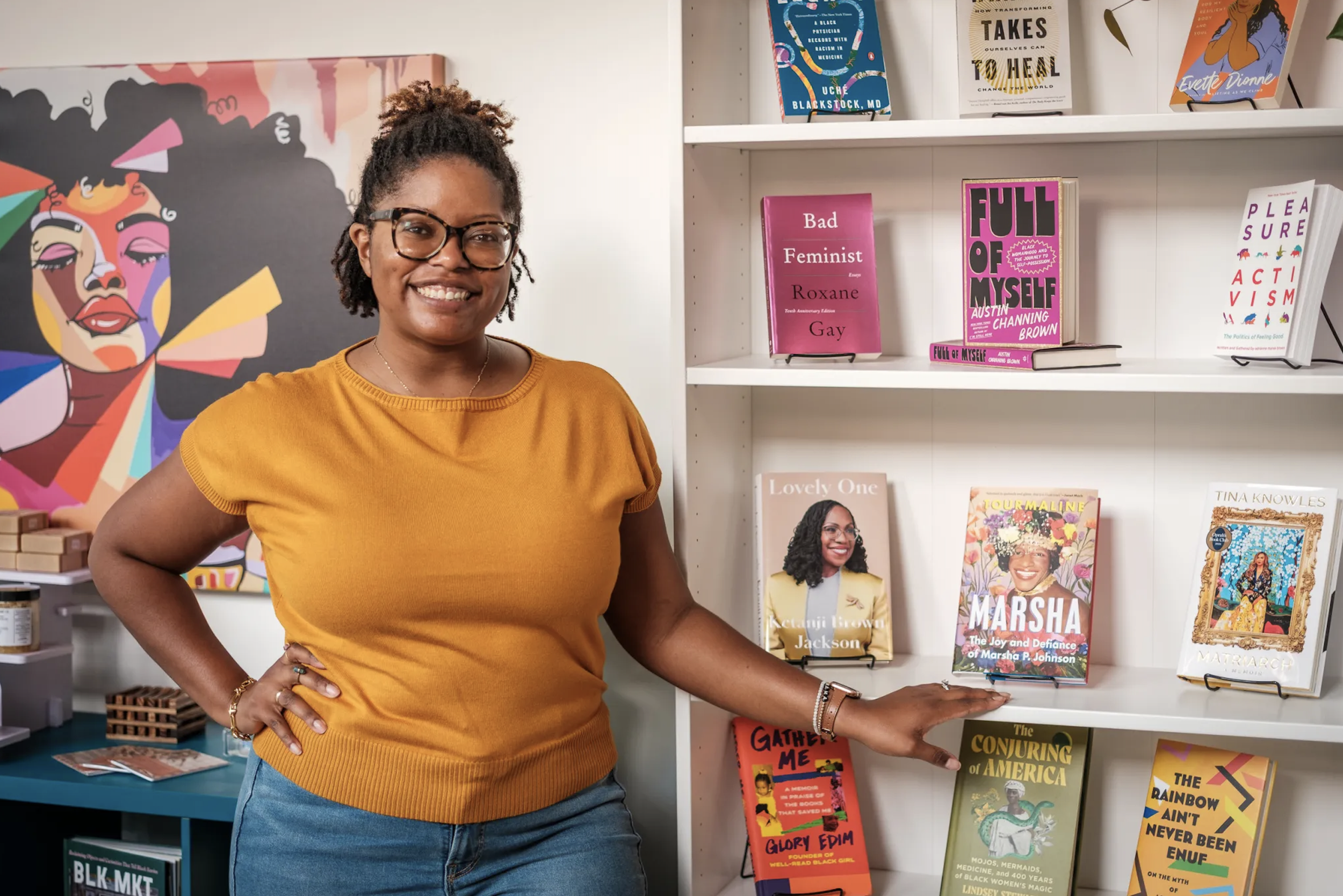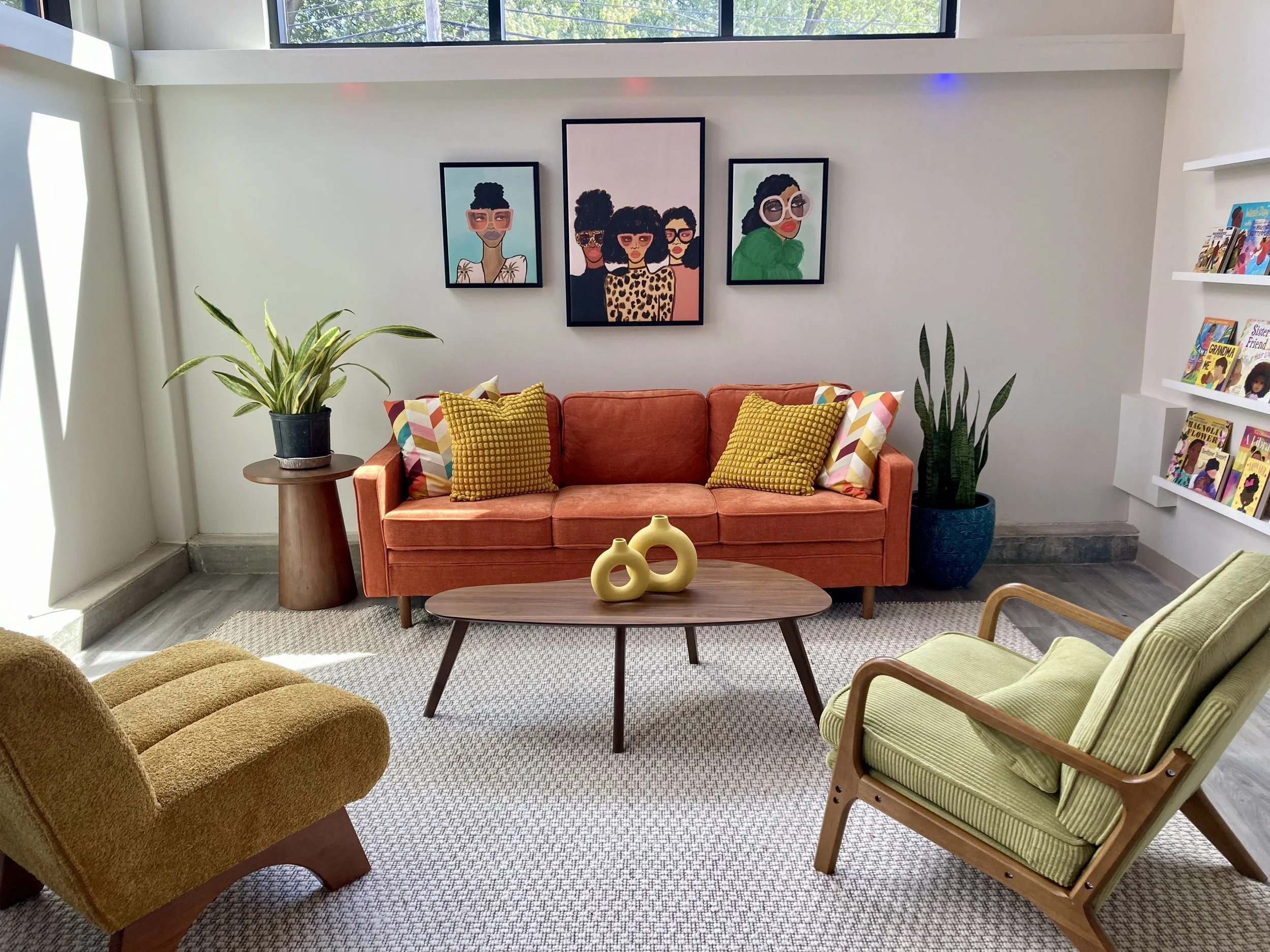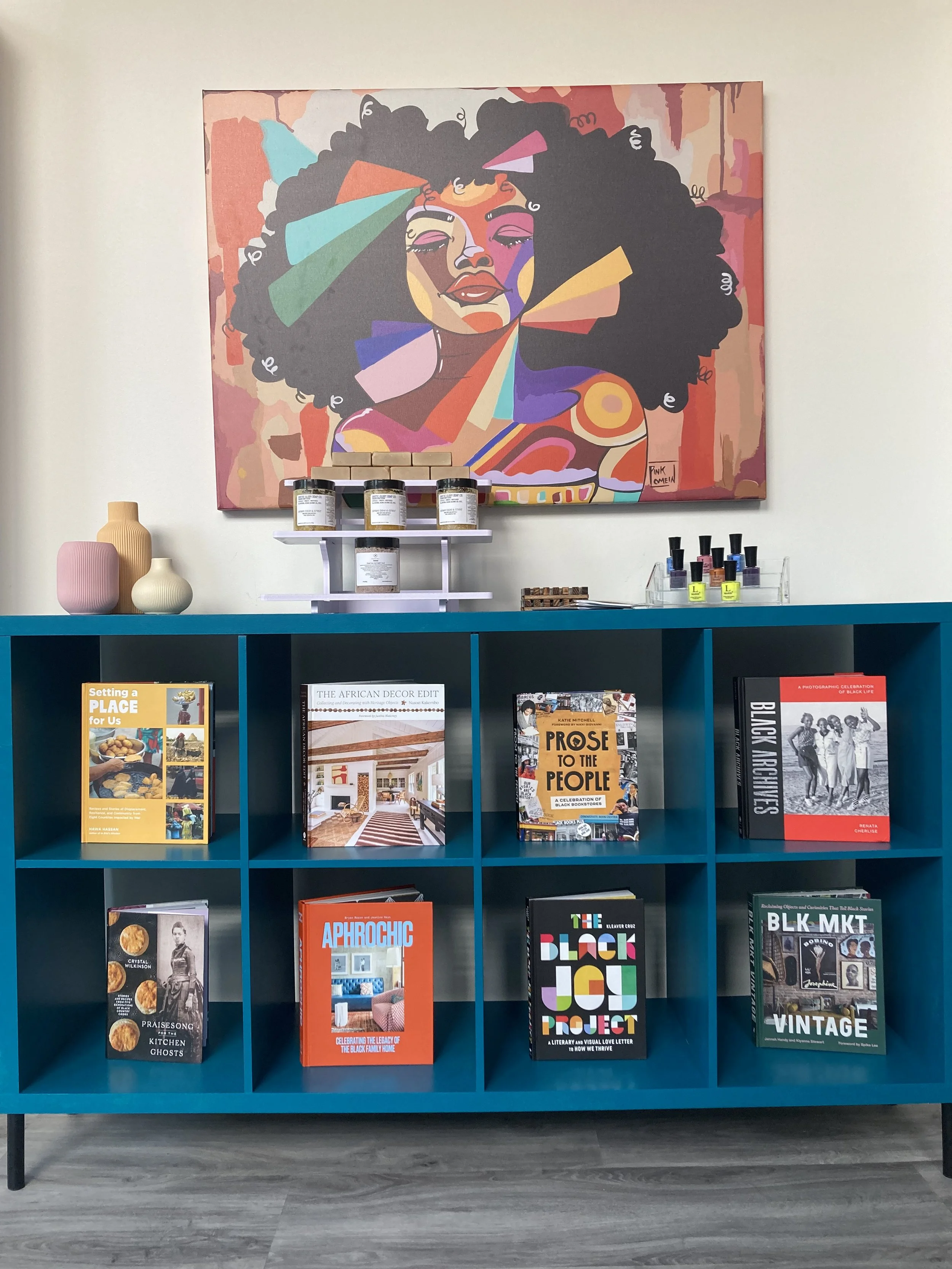Interview: L’Oreal Thompson Payton, Journalist, Writer, Owner– Zora’s Place
From the moment she first pressed pencil to paper—at three years old, a spiral notebook balanced on her knees—L’Oreal Thompson Payton understood that language could be a place to live. Over time, that instinct became a powerful compass. As a writer, journalist, and now the founder of Zora’s Place– Evanston, Illinois’ first Black feminist bookstore, she has moved through the world with a steady devotion to representation: writing herself into stories long before she ever saw herself reflected.
Zora’s Place arrives at a moment when publishing’s promises feel suspended; when doors crack open only to narrow again, and whose stories matter is still too often negotiated. Named in homage to author Zora Neale Hurston, the space is deeply intentional. Yet calling it a bookstore feels incomplete. It’s a community hub, a third space, a soft landing for those who have too often been asked to make do without one. Thompson Payton’s curatorial lens extends beyond the page: Black women-owned products, wellness rituals, gatherings that carry joy and protest in the same breath.
In our conversation, Thompson Payton reflects on claiming authorship in an industry that rarely makes room, on kicking doors wider when they shift even a little, and on building a space where Black women are centered without apology. More than anything, she reminds us that community—real, embodied, in-the-room community—is no longer optional. It’s the core assignment.
You've built a life around language as a writer, editor, and now through Zora's Place. How would you describe your earliest relationship with writing, and what has stayed constant about it over time?
I love the wording of that question. In my first book, Stop Waiting for Perfect, in one of the earlier chapters, there is a picture of me about three and a half, sitting on the sofa with my sister, who's probably about six months or so at the time, and I have this spiral-bound notebook, probably wide-ruled, in my lap. And I don't know what I was writing that day. It kind of looks like I'm interviewing her, but she's like six months old and can't talk. And I mean, I'm three, I can't write, but that is the earliest memory I have about writing. When I was six, I wrote this book about dinosaurs in outer space. I've always had my nose in a book since very early on.
“I think even at a young age… I was writing stories to write myself in, to write that representation that I didn’t see.”
There were times when we were in the car driving home from somewhere, and I would use the headlights from the car behind us to read my book. Books were always a place to escape. And even as a child, I recognized the lack of diversity and representation in a lot of those books at the time. I love Berenstain Bears. I loved Sweet Valley High, Goosebumps. I loved all of those, and didn't see little Black girls in those stories. And so I think even at a young age, I don't think it was necessarily a conscious thing, but I was writing stories to write myself in, to write that representation that I didn't see.
And that's been the through line and everything that I've done, from elementary years to high school. Through being the editor-in-chief of the student newspaper, through the internships I've had and other writing-specific roles in newsrooms and even nonprofits, and now as an author, representation has always been top of mind. I wanted to be editor-in-chief of a teen magazine because I didn't want any other little Black girls to feel the way that I did, which was literally praying to God to make me white.
What was the spark that led you to create Zora's Place? Did it begin as a response to something missing in the literary world or as a natural extension of your own creative community?
A little bit of both. So in 2019, a couple of friends and I were in a book club together, and I used the term book club very loosely, because it was kind of a very much BYO book club where we read different books, and then we just met on Zoom to talk about it.
“Zora’s Place is more than a bookstore. It is meant to be a community hub.”
I wasn't even back in full-time journalism yet. I was still in nonprofit PR and just putting the idea on the back burner. And since then, since becoming an author myself, frequenting the independent bookstores that we have here in Chicago– I love Call and Response down in Hyde Park. Courtney, the owner, has been an amazing resource for me during the process of opening my own store, and I believe Evanston deserves this, too. There weren't any Black-owned bookstores. I didn't want to drive 45 minutes to Hyde Park every time I wanted to support a Black woman-owned bookstore. Being the firstborn daughter, an overachieving millennial like that I am, I decided that I should do something about that.
The crowdfunding campaign took off, and now, especially in this moment in time and this political climate, I tell everyone that Zora's Place is more than a bookstore. It is meant to be a community hub. It’s rooted within the Aux Wellness Collective that supports the mental, physical, financial, spiritual, and emotional health of everyone, but especially Black women.
And I think though, as a Black woman author myself and knowing from publishing how we are often pushed to the side, I was like, no. If I'm gonna do this, I'm gonna stand 10 toes down and make this about Black women. Period. And so 99.9% of our books are written by Black women. There are a couple of children's books written by a few good men, because our little boys need to have books that feature them, too.
And then, in naming it after Zora Neale Hurston, Their Eyes are Watching God is my favorite book of all time. Zora's really a pioneer in her own right. And so I wanted this to pay homage to her. And even beyond the books, all of the sideline items that we have, the scrubs and the nail polish and the puzzles, are all Black women entrepreneurs. Half of whom are local to the Chicagoland area. So everything is very intentional– when you come in here, there's a peace of mind of knowing that you are supporting a Black woman-owned business.
The publishing industry has changed in recent years. Shrinking opportunities, fewer editors of color, and a shifting idea of what's considered marketable. From your perspective, what are the forces shaping that landscape right now?
There was a blip in 2020. Of course, we all know what happened in the summer of 2020. The racial reckoning also happened to be when I signed with my previous agent. And I like to think that is because my book is good and I'm a great writer and all of those things. I believe that that is true, and there was a moment in time where across industries and publishing especially, I think people were like, “Oh my gosh, we need diverse voices.” And so everyone was rushing out to find their Black author, right?
I do think that two things can be true. And as an author, I don't want to take advantage of that, right? I didn't give myself the book deal or sign myself to an agency. When the door opens an inch, I'm gonna kick it down and step all the way in, which is what I have done.
When I was shopping around my infertility memoir, I mutually parted ways with my previous agent because she wasn't sure that it would sell. There were a lot of naysayers because memoir itself is a hard category to break into. And then I think as a Black woman, especially, unless you're a celebrity or public figure, there were a lot of discouraging notes from the people in the industry. And the thing about me, though, is I'm a Scorpio. If you tell me that I can't do something, I'm gonna make it my life's mission to prove you wrong.
There’s a long history of trying to minimize, reframe, or altogether erase Black stories in publishing and media. How do you see your work, both in your writing and with Zora's place, as engaging with this moment in time?
Yeah, no, you're not ignoring us. That was very intentional, too, in the title of my memoir. So for Infertile Black Girl (Payton Thompson’s in-progress memoir about her experience with infertility), there were two original titles that I was working through, one of which was “Infertile Ground”. When people say they hear the “voice of God”, I feel like mine has always been these kinds of whispers and nudges– and the voice that day was: “Infertile Black Girl”. And that was it– because that says everything.
My experience is unique, going through infertility as a Black woman. Wellness in general is a very white space. By naming that and not shying away from it, that means everything to me. It all goes back to representation with me. And there are women that I've met in different support groups, other Black women who've shared the same sentiment about infertility on its own, which is already kind of isolating. And then, when you throw being someone from a marginalized identity on top of that. The isolation just compounds.
Community is a through-line in your work, not just who you write for, but who you create with. What does community mean to you in this moment?
Community is everything, especially in this moment in time. I had a hunch after last year's election that community was going to be even more important. And that was really going to be a theme in 2025. And especially in-person community, I found that in every single group that I'm talking to, people are craving that community and connection.
That's why on the website and every time I talk about Zora's Place, I say it’s more than the bookstore– it’s also a community space because we don't have a lot of third spaces. I want this to be a space where people feel comfortable coming here to study or just have a quiet place to be. At our soft opening, someone from the community bought a book, and she asked if it was okay if she sat and read. Of course, I said yes– that's what it's there for.
I want to create a Black feminist book club. I want to create a Black romance book club. This is why we have a romance section as well, because that is also revolutionary. Black Romance is a form of protest. And so it's very intentional. And the products that we have– having the scrubs, the candles, the soaps, and the nail polish, all of that is part of your health and wellness and self-care, and making time for yourself as well. So, I feel now, and for the foreseeable future, it is our number one charge.
Learn more about L’Oreal and her work here, and Zora’s Place here.
Portrait of L’Oreal Thompson Payton by Joerg Metzner & images of Zora’s Place by EE Bauer Photography
Footnotes: A Brief History of Black Women & Print Culture
Black women have always built literary ecosystems when existing ones refused them. Their publishing, printing, and distributing have been less about capital and more about survival, memory, and community.
Kitchen Table Press (1980–1996)
Founded by Barbara Smith and Audre Lorde, Kitchen Table became an urgent corrective to the white feminist publishing landscape. It didn’t just publish books — it published voice, making space for women of color to speak in their own language, on their own terms. It was understood that representation wasn’t a luxury; it was infrastructure.
Black Feminist Bookstores of the 1970s–90s
Spaces like Sisterwrite and Umoja Bookstore served as literal and figurative shelter. They were hubs for study groups, food drives, childcare swaps, and quiet resistance. Long before algorithms, these spaces curated the canon by hand, offering the kind of hyperlocal curation streaming culture can’t touch.
The Harlem Salons
In the 1920s, living rooms became publishing houses. Zora Neale Hurston, Jessie Redmon Fauset, and Georgia Douglas Johnson circulated manuscripts, shared edits, and built professional networks. These salons transformed domestic space into a cultural engine, insisting that Black women’s intellect was worthy of architecture.
Independent presses of the 2000s
As conglomerates grew risk-averse, Black women responded by launching small presses, chapbooks, zines, and community-run imprints. Their work wasn’t “niche”; it was archival, documenting the lives the market shrugged at. Many of these projects became primary sources in today’s scholarship.
Across every decade, the pattern holds: when the door is closed, Black women build their own rooms, invite others in, and leave the lights on. The lineage is less linear and more like a constellation: bright, scattered, and impossible to forget once you’ve seen it.
Zora’s Place doesn’t imitate that tradition; it extends it– intentionally, with its own focus. And with the same belief: that literature isn’t merely consumed, it’s lived, together.



